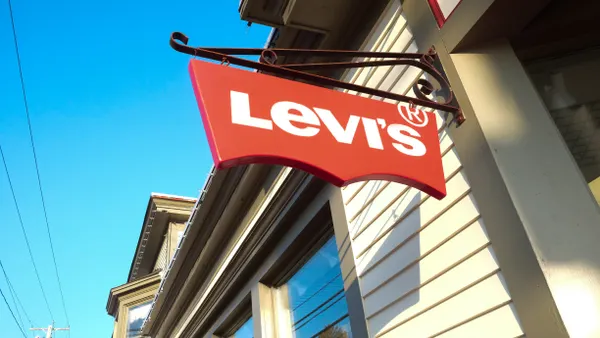Dive Brief:
-
The Nordstrom family group examining whether and how to take the department store retailer private is running into financing difficulties that are endangering a deal, the New York Post reported Monday, citing unnamed sources, one of whom called it "in deep trouble." Shares took a hit Monday on the report as multiple financial media outlets picked up the story.
-
Overall challenges in retail, especially at malls, have been a concern amidst the talks, reportedly including private equity firm Leonard Green & Partners, and the surprise bankruptcy declaration by toy retailer Toys R Us last month is exacerbating worries among the parties, including the Nordstroms, according to the report.
-
Leonard Green was preparing to sign off on an equity stake of some $1 billion if not more, contingent upon Nordstrom getting financing at what it deemed an acceptable level, the Post said. Requests for comment and clarification from Retail Dive to Nordstrom, the family group and Leonard Green weren’t immediately returned. Nor was the report refuted by the close of markets Monday.
Dive Insight:
A retailer in need of a turnaround can benefit greatly from going private, in order to make long term changes away from the short-term growth demands typically emanating from Wall Street. Nordstrom in particular is well positioned to make such a move, experts have told Retail Dive.
"[Wall] Street expects positive results quarter by quarter, which even in the best of times is often unrealistic," Mark Cohen, director of retail studies at Columbia University's Graduate School of Business, told Retail Dive. "Let alone times when the industry at large is in turmoil, or a specific retail company is in some form of turnaround or transition. Going private, assuming it did not entail taking on a crushing level of debt, may very well be the best thing that could happen to Nordstrom."
The move makes sense for a retailer that has faltered in recent quarters, but isn't piled with a lot of debt and has operations with value buried deep within the wider company. A private restructuring would likely take Nordstrom three to five years, Howard Davidowitz, chairman of New York City-based retail consulting and investment banking firm Davidowitz & Associates, told Retail Dive. Nordstrom is "brilliantly" positioned to go private because of the loyalty of their customers, their commitment to customer service, the Nordstrom Rack business (established more than four decades ago) and their "very powerful" online business, he said.
But partnering with private equity can be a tricky move for a retailer hoping to executive a major turnaround because some firms withdraw funds along the way, in the form of dividends to shareholders or fees from the companies they hold. That can hamper turnaround efforts by weakening necessary investment in talent and operations. In such cases, the financial firms also bring with them debt burdens that can make it difficult for retailers in need of a transformation to properly invest in a turnaround, whether it entails beefing up traditional efforts like merchandising or developing new systems to meet modern supply chain demands wrought by e-commerce. Instead, private equity turns to the debt spigot for dividends.
While retail companies with low debt can ride out bad times, highly leveraged ones can swiftly find themselves in danger of faltering badly. Yet their owners, time after time, don’t pay the price. When a private equity firm piles on debt, not even the most esteemed retail gurus can apply the remedies these companies need, whether old-school or unconventional, experts told Retail Dive. Sources told the Post that debt levels worry members of the Nordstrom family, who retain a 31% in the retailer worth some $2.4 billion and are concerned they could hamstring the long-term plans and put that fortune at risk.
Distressed bond issuers in the U.S. retail and apparel markets are nearing recession levels, tripling in the past six years, according to a Moody’s report emailed to Retail Dive earlier this year. By Moody’s measure, 13.5% of its retail and apparel portfolio is distressed, compared to 16% during the Great Recession. Debt maturities are also headed toward record levels over the next five years, Moody’s said.
"We do have to be careful not to paint all private equity with the same brush," Eileen Appelbaum, senior economist at the Center for Economic and Policy Research and author of "Private Equity at Work: When Wall Street Manages Main Street," told Retail Dive earlier this year. "The thing is, though, that we look at the 'retail apocalypse' and we say that it’s all Amazon, but the truth is that it’s not all Amazon. Private equity often leaves these retailers unable to cope with any change in the environment — it could be taste that you have to adjust to, it could be a downturn in the economy that you have to survive or it could be a disruption like Amazon. But you need resources to respond to that. I’m not saying that Amazon has nothing to do with it — Amazon is the challenge. If [retailers are] private equity owned, chances are they won’t have the ability to adjust."














